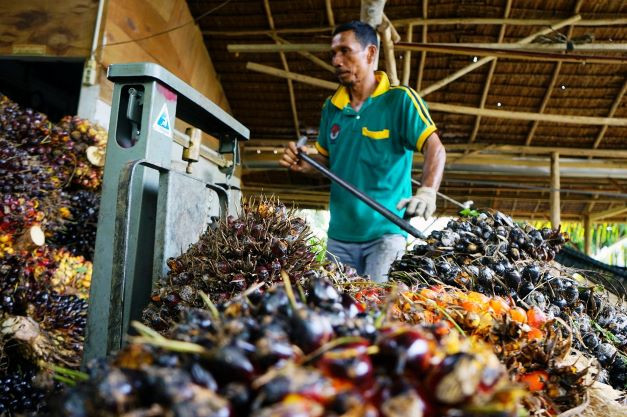Popular Reads
Top Results
Can't find what you're looking for?
View all search resultsPopular Reads
Top Results
Can't find what you're looking for?
View all search resultsEurope should do more to support Indonesia’s farmers and SMEs
Among ASEAN nations, Indonesia is among the most critical in the international fight against climate change.
Change text size
Gift Premium Articles
to Anyone
A
t the end of March, hundreds of oil palm farmers from across Indonesia rallied outside the European Union Embassy in Jakarta to protest a new regulation that bans the import of products made from agricultural commodities produced on recently deforested or degraded land.
The new law will mean that from 2024 the EU will require companies and smallholder farmers working in Indonesia, and other countries in Southeast Asia, to certify that their agricultural products – including palm oil, rubber, coffee, and timber – are not linked to recent deforestation and to provide data to prove it.
However, due to the strict requirements for traceability and geolocation data that the regulation imposes, Indonesia’s SMEs and smallholder farmers are likely to struggle to comply and therefore risk being excluded from EU markets.
This new EU regulation poses a direct threat to the livelihoods of farmers and risks exacerbating the very economic and social conditions that encourage encroachment into adjacent forests – already a major cause of deforestation and biodiversity loss. To help meet the new demands set by the EU, Indonesia’s farmers need more financial support and access to training and new technologies to help them increase yields, while transitioning to more sustainable practices.
Among ASEAN nations, Indonesia is among the most critical in the international fight against climate change. It is home to the third largest expanse of rainforest globally, which acts as an invaluable carbon sink. Just as importantly, its rainforests provide a habitat for vast biodiversity, including unique species like the Sumatran tigers, Borneo elephants, Sumatra and Javan rhinos, and more than three-quarters of the world’s orangutans.
Indonesia is also one of the world’s biggest producers of agricultural commodities – palm oil, timber, rubber, and coffee – for which global demand continues to grow at around 3 percent per year. These industries are critical to Indonesia’s economy, employing around 10 million people and accounting for around 5 percent of gross domestic product.
Indonesia stands out in ASEAN as having made strides in reducing deforestation. Yet while these commodities remain favored by consumers in Europe and globally, and while there is limited financial incentive to change growing practices, we will continue to see production coupled to forest and biodiversity loss.
Growing awareness among consumers in Europe, and other parts of the Global North, that their demand for agricultural commodities may be linked to deforestation and climate change has created a powerful momentum for change. Standards and regulations have proliferated to try to create “cleaner” and “greener” supply chains and encourage the transition of production to more sustainable practices.
This is welcomed and is supporting real improvements in Indonesia and other parts of Southeast Asia. However, there is a need to address the growing perception that regulations are being imposed on Indonesia and other producing nations, with limited dialogue or financial support for the farmers and smaller companies directly involved in production. This can lead to unintended consequences for communities, for farmers and the forests that the regulations are meant to protect.
Sustainable finance is a force for change.
Sustainable debt finance offers one potential solution. Sustainable financing – including green bonds – is debt that comes with environmental, social and governance commitments for the company receiving the finance. Investment in sustainable finance instruments issued by entities involved in agricultural commodity supply chains in Indonesia, offer an important way for European stakeholders to support sustainable production and protect rural livelihoods.
For example, sustainable debt financing could be used to help small farmers and SMEs adopt more sustainable practices and comply with the new EU Regulation on deforestation-free products. Land used to sustainably produce agricultural commodities can also act as buffer zones to protect surrounding forests from illegal logging and hunting.
Currently limiting the flow of sustainable finance into Indonesia is the lack of one clear and standardized framework that enables overseas investors to have clarity over the environmental impact of their investments. Today, there exist many international guidelines and voluntary standards for assessing the sustainability of projects, but the space remains fragmented.
Through our experience working in Indonesia, we have seen that debt finance can be a powerful force for change. Indonesia’s farmers and forests cannot wait for a common framework to be created. Finance is needed now if they are to adapt to meet the new EU standards.
Governments, companies, investors, and financial institutions in Europe, and other parts of the Global North, need to work together to mobilize resources to support Indonesia’s farmers and their sustainability transition.
Sustainable finance is not the silver bullet, but it is a force for change. It can help to stimulate greener growth, protect forests and biodiversity, and support the transition of Indonesia’s farmers to a more sustainable future.
***
The writer is co-founding partner and chief investment officer, ADM Capital.











